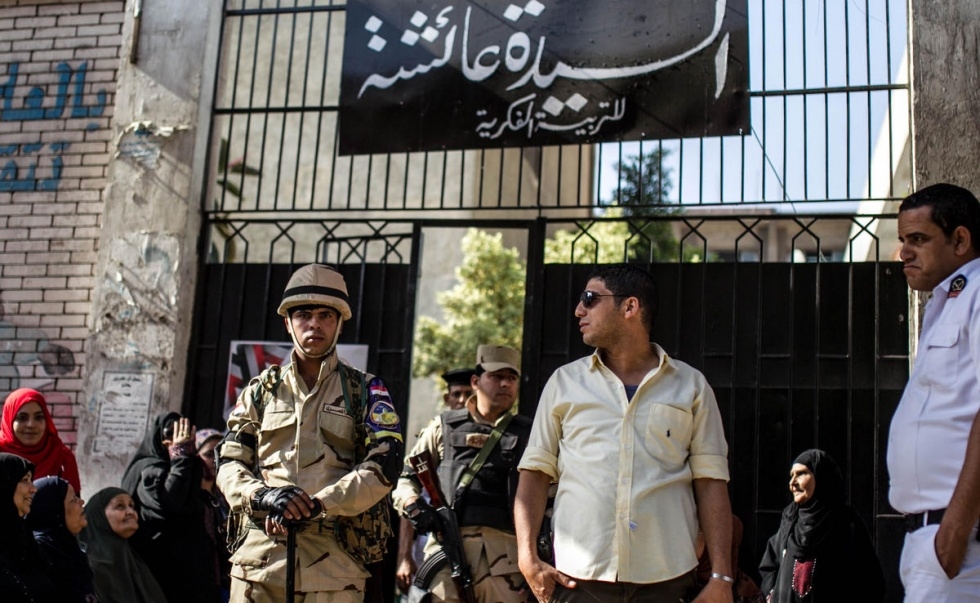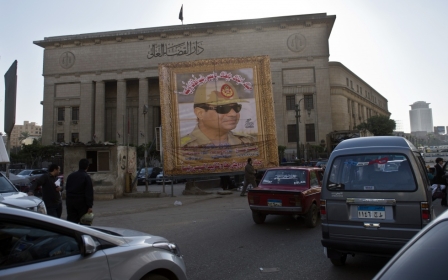Egyptians vote for president after years of turmoil

Egyptians are voting for a new president on Monday, with the ex-army chief who overthrew the country's first democratically elected leader and crushed his Islamist movement expected to win in a landslide.
The two-day election is the first since the frontrunner and former army chief Abdel Fattah al-Sisi deposed Islamist president Mohamed Morsi in July, a move that unleashed the bloodiest violence in Egypt's recent history.
Morsi's Muslim Brotherhood movement is boycotting the vote, as are revolutionary youth groups who fear Sisi is an autocrat in the making.
But the 59-year-old retired field marshall is expected to trounce his sole rival, leftist Hamdeen Sabbahi, amid widespread calls for stability.
Polling stations opened Monday morning for 53 million registered voters, with Sisi arriving early at a Cairo polling station to cast his vote amid a throng of jostling reporters and supporters.
New MEE newsletter: Jerusalem Dispatch
Sign up to get the latest insights and analysis on Israel-Palestine, alongside Turkey Unpacked and other MEE newsletters
There are 13,900 polling stations across the country's 27 provinces, including 325 general stations to which vote-counting results will be submitted.
The vote is the second step in the post-Morsi transitional roadmap, which included a constitutional referendum in January and concludes with parliamentary elections later this year.
The winner of the polls will take over from interim president Adly Mansour, who was installed by the army following Morsi's ouster and subsequent imprisonment.
Five international organizations and 79 local ones have been authorized by the electoral commission to observe the voting process.
In addition to nongovernmental monitors, envoys from the Arab League; the European Union; the African Union; the Common Market for East and South Africa will follow up the vote.
Around 300,000 police and army personnel have been deployed to secure the process nationwide.
Referendum on stability?
Many view the vote as a referendum on stability versus the freedoms promised by the Arab Spring-inspired popular uprising that ousted veteran strongman Hosni Mubarak in 2011.
The country of 86 million people has been rocked by sporadic unrest and a tanking economy since then.
Mubarak's successor, the Islamist Morsi, lasted only a year in power, winning the country's first democratic presidential election only to quickly alienate many Egyptians who held mass rallies demanding his resignation.
"We need someone who speaks in a determined and strong way. The Egyptian people are frightened by this and respect those who are like this," said Milad Hanna, a 29-year-old lawyer, as he lined up outside a polling station in Cairo.
Hanna said he had voted for Sabbahi in the 2012 election that Morsi won, but will now vote for Sisi.
"We need someone strong, a military man," he said.
Sisi has said "true democracy" would take a couple of decades to reach Egypt, and suggested he would not tolerate protests that he said disrupt the economy.
He has also pledged to wipe out the Brotherhood, which had won every election after Mubarak's overthrow after being banned for decades.
The Islamist movement is boycotting the election and said on Sunday it would not recognise the outcome.
Heavy security
"Forgery will never grant legitimacy to a butcher nor will it lessen the determination of revolutionaries," the Brotherhood said in a statement.
The vote, monitored by international and Egyptian groups, is not expected to be marred by widespread rigging.
The Brotherhood, now blacklisted as a terrorist group, has been decapitated in a police crackdown that has killed more than 1,400 people, including an estimated 700 protesters on one day in August.
Morsi himself has been detained and placed on trial.
Hundreds of soldiers and policemen have been killed in militant attacks since Morsi's overthrow, with the deadliest claimed by an Al-Qaeda-inspired group based in the restive Sinai Peninsula.
The military and police deployed heavily to secure polling stations.
Sisi has called for a high turnout in the election, billed by the military-installed authorities and the West as a milestone toward elected rule in the country.
"You need to go down now more than any other time in (the country's) history. Go down, show to the entire world that there are 40, 45 (million) or even more" voters casting their ballots, Sisi said as campaigning closed on Friday.
The presidential poll will be followed by parliamentary elections this year
Sisi's sole election rival Sabbahi, a veteran dissident, has vowed to defend the democratic aspirations of the 2011 revolt.
"We swear to God that symbols of corruption and despotism (from the Mubarak era) will not return," he said on Friday.
The interim authorities have justified the overthrow of Morsi by saying the army heeded mass street protests against the Islamist's single year of divisive rule.
The April 6 youth movement, which spearheaded the anti-Mubarak revolt and whose leader has been jailed, has called for a boycott of the election.
Middle East Eye delivers independent and unrivalled coverage and analysis of the Middle East, North Africa and beyond. To learn more about republishing this content and the associated fees, please fill out this form. More about MEE can be found here.



